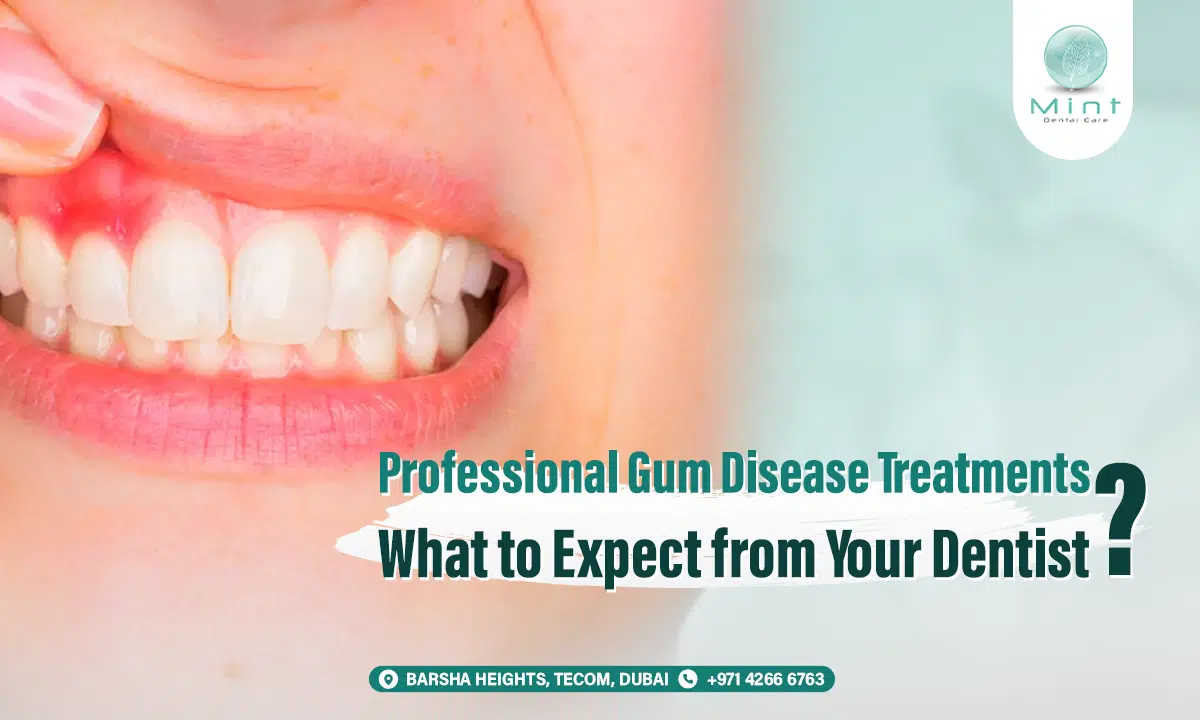Gum disease, also known as periodontal disease, is a serious oral health condition that affects the gums and supporting structures of the teeth. If left untreated, it can lead to gum recession, tooth loss, and even affect overall health. Many people ignore the early signs of gum disease, thinking it is just minor gum irritation, but this condition can quickly progress if not treated by a professional dentist. Fortunately, with advanced gum disease treatments, it is possible to restore gum health and prevent further complications.
If you have symptoms like bleeding gums, persistent bad breath, or gum swelling, it’s essential to seek treatment as soon as possible. Many patients feel anxious about gum disease treatments, but knowing what to expect can help ease any concerns. At Mint Dental Care in Dubai, we offer a range of non-surgical and surgical gum treatments to help patients maintain healthy gums and prevent long-term dental problems.
What Is Gum Disease?
Gum disease is caused by bacteria buildup in the gums, leading to infection, inflammation, and destruction of the tissues supporting the teeth. It is mainly triggered by poor oral hygiene, plaque accumulation, and lifestyle factors like smoking. If not treated early, it can result in tooth loss, jawbone damage, and increased risk of other health issues, such as heart disease and diabetes.
There are two primary stages of gum disease: gingivitis and periodontitis. Gingivitis is the early stage, where the gums become red, swollen, and bleed easily. At this stage, the damage is still reversible with professional cleaning and improved oral hygiene. Periodontitis is the advanced stage, where the infection spreads deeper, causing gum recession, bone loss, and loose teeth. This stage requires more extensive treatment to stop progression and restore gum health.
What to Expect During Professional Gum Disease Treatment
Comprehensive Gum Health Evaluation
Before beginning treatment, your dentist will conduct a thorough gum examination to assess the severity of the disease. This includes checking for gum inflammation, measuring pocket depth around the teeth, and taking digital X-rays to evaluate bone loss. The dentist may also ask about your oral hygiene habits, medical history, and any symptoms you have noticed, such as bleeding gums or bad breath.
A proper diagnosis is essential to creating a personalized treatment plan that effectively targets the infection. Patients with mild gum disease may only need a deep cleaning, while those with advanced periodontitis may require surgical treatments to restore damaged tissues. The goal is to eliminate harmful bacteria, prevent further damage, and help the gums heal properly.
Professional Dental Cleaning (Scaling and Polishing)
For patients with early-stage gingivitis, a routine professional cleaning may be enough to remove plaque and tartar buildup. This procedure, known as scaling and polishing, helps eliminate bacteria and prevent gum inflammation from worsening. During the treatment, the dentist uses specialized instruments to clean the teeth and gum line, removing plaque deposits that cannot be removed by regular brushing.
Polishing is done after scaling to smooth the tooth surfaces, making it harder for bacteria to stick. This procedure is painless and helps patients maintain healthy gums and fresh breath. Regular dental cleanings every six months are essential for preventing gum disease and maintaining overall oral health.
Deep Cleaning (Scaling and Root Planing)
For patients with moderate periodontitis, a deep cleaning procedure called scaling and root planing is required. Unlike a routine cleaning, this treatment focuses on removing plaque and bacteria from deep below the gum line to stop infection and promote healing. The procedure involves two steps:
- Scaling removes hardened plaque (tartar) from the tooth roots and gum pockets.
- Root planing smooths the tooth roots to help the gums reattach to the teeth.
Since this treatment targets deep areas of the gums, local anesthesia may be used to keep patients comfortable. Scaling and root planing reduce gum inflammation, shrink periodontal pockets, and prevent bacteria from spreading further. Patients may experience mild gum sensitivity after the procedure, but this usually improves within a few days.
Laser Gum Therapy
For patients with severe gum disease, laser therapy is an advanced, minimally invasive treatment that effectively removes infected tissue and bacteria. Unlike traditional surgery, laser treatment does not require incisions or sutures, making recovery much faster. The laser precisely targets diseased gum tissue, eliminating bacteria while preserving healthy tissue.
Laser therapy promotes faster healing, reduces bleeding, and stimulates gum regeneration. It is a preferred treatment for patients who want an effective, pain-free alternative to traditional gum surgery. At Mint Dental Care in Dubai, we use state-of-the-art laser technology to ensure a comfortable and successful gum disease treatment experience.
Antibiotic Therapy for Gum Infection
In some cases, antibiotics may be prescribed alongside other gum disease treatments to eliminate bacterial infections. These antibiotics can be in the form of topical gels applied to the gum pockets, mouth rinses, or oral tablets.
Antibiotic therapy helps fight deep-seated bacterial infections, reducing gum swelling and improving overall gum health. It is often used as part of a comprehensive treatment plan that includes deep cleaning and laser therapy. Patients must follow their dentist’s instructions carefully to ensure effective results and prevent antibiotic resistance.
Surgical Treatments for Advanced Gum Disease
For patients with severe periodontitis, surgical procedures may be necessary to restore gum health and prevent tooth loss. Common surgical treatments include:
- Flap Surgery (Pocket Reduction Surgery): The gums are lifted back to remove deep plaque and bacteria before being stitched back into place.
- Gum Grafting: Tissue from another area of the mouth is used to cover receding gums and restore lost gum tissue.
- Bone Grafting: If periodontitis has caused bone loss around the teeth, a bone graft is performed to regenerate the jawbone and provide stability.
Surgical treatments are only recommended for advanced cases of gum disease, where non-surgical treatments are no longer effective. With modern techniques, these procedures are now less invasive and have faster recovery times.
How to Prevent Gum Disease After Treatment
Gum disease can return if proper oral hygiene is not maintained, so it is essential to follow these preventive measures:
- Brush your teeth twice a day using fluoride toothpaste to remove plaque.
- Floss daily to clean between teeth and along the gum line.
- Use an antibacterial mouthwash to kill bacteria and freshen breath.
- Avoid smoking and sugary foods, which contribute to bacterial growth.
- Visit your dentist every six months for professional cleanings and gum check-ups.
Why Choose Mint Dental Care for Gum Disease Treatment in Dubai?
At Mint Dental Care in Al Barsha Heights, Dubai, we specialize in comprehensive gum disease treatments using the latest technology and personalized care. Our expert dentists offer advanced deep cleaning, laser therapy, and gum surgery to help patients achieve healthy, disease-free gums.
What Sets Us Apart?
✔ Experienced Periodontists who specialize in gum health and disease treatment.
✔ State-of-the-art laser therapy for minimally invasive gum treatments.
✔ Comfortable & painless procedures with sedation options.
✔ Customized treatment plans based on individual gum health needs.
✔ Affordable payment plans to make gum disease treatment accessible.
Schedule Your Gum Disease Consultation Today!
If you are experiencing bleeding gums, gum recession, or persistent bad breath, don’t wait until the problem worsens. At Mint Dental Care in Dubai, we provide expert gum disease treatments to restore your oral health and protect your smile.
Call us today to book your consultation and take the first step toward healthier gums!















